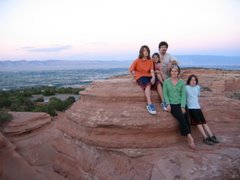I think this is a very interesting video and worth taking the time to watch. He is talking about technology but I think it applies to all learning. Unschoolers already know these things because we have seen it happen with our own children- first hand. We know our kids learn when it is relevant to their life, when they are exposed to new experiences and ideas, and when the resources are made available to them
I think what this proves is that children do learn on their own but what they do need are resources. If they have the resources available to them they can learn anything, without teachers and without schools. I'm thankful that there are people who are doing the research and re-examining how we educate our children and how damaging imposed learning is.
I loved these following comments about the video:
"I too, am a home-educating/unschooling parent. I found HITW very fascinating, because that runs along the same theme as what we as parents do with our children. I've heard it being given the term "strewing". Leave something of interest around the house (say, a magazine) and eventually a kid picks it up and reads about it, leading to either discussion, further exploration, if the subject strikes their fancy. We see our role, as parents, as "facilitators", whose job it is to expose them to many things and then follow their leads with what they are interested in.
Nature itself shows the obvious, that we as human beings are naturally curious, and seek out what we are interested in and/or need to know. The wonderful talk by Sugata Mitra was a very informative answer to how children learn." ~Ariannah Armstrong
~~~~~~~~~~~~~~~~~~~~~~~~~~~~~~~~~~~~~
" The takeaway is that children learn eagerly and effectively when the content is real and immediately relevant to them and when they have others actively and interactively helping them to master the content in real time according to their immediate needs. Throw into that mix adventure and social sharing and Sugata Mitra has shown us what happens when these things occur together. Additionally, those of the hands-on learning style and those who prefer to observe first are equally well served. Together these things produce a synergy that make the hole in the wall experiment an excellent success story." ~Reid Albecker
~~~~~~~~~~~~~~~~~~~~~~~~~~~~~~~
"I would urge you (and all of us) to be more careful mistaking the word education and the word school/schooling. It may seem like semantics but I believe if we really made the internal mental shift to articulate the difference and were really good about calling things schooling when they are schooling and education when it is education I believe we would have a platform for making decisions about what to do next.
Education is a radically different thing from schooling. Education is something that comes from the inside - out. Like what you have shown here. What you have discovered in your research is that learning can and does happen without the need for schooling. As is mentioned in previous comments learning is a natural human trait and does not require schooling.
Schooling is schooling - which means that it is NOT education nor will it ever be education. Part of the reason I think this distinction is important is because many people involved in school reform make this mistake. Trying to force schooling to become education is where a lot of problems lie. Almost all of the frustrations that occur when attempting to do something cool with schooling is because of this distinction.
NOTE: It is possible that education might have some element of schooling as part of it but that would be a choice one would make once one understands the implications of that." ~Michael Kaufman
~~~~~~~~~~~~~~~~~~~~~~~~~~~~~~~~~~~~~~~~~~
"It is of an extreme value that we can interact with you here. Thank you for taking your time to chat with us!
I find your work very important. In my opinion it prooves that learning is a basic function of healthy child brain and it doesn't need any formal methods. It is just natural for a kid to explore and learn. So what we have to do is to provide a healthy and prosperous environment for them to learn. Formal education is full of data but often it is deatached from "real life" and does not give you the proper experience (as opposed to knowledge) to deal in real life and accademic situations. Self organised systems can do the opposite - they are not just the simulation of life (or science, technology...so on), they ARE life and science and technology. They already are what we have to learn as children. They are not just raw data to be memorized.
I hope I didn't go too far with this. Perhaps a well-ballanced mix of both is required, but we have to find such a ballance between formal ("data input") ways of educations and self-organized systems. I for one work as menthor of small workshops and I find your experience very valuable for my work, so thanks for sharing!" ~Marjan Krebelj
Saturday, June 13, 2009
Subscribe to:
Post Comments (Atom)



1 comment:
Just for posterity sake...the term "strewing" was something Sandra Dodd came up with. Kewl comments!
Post a Comment